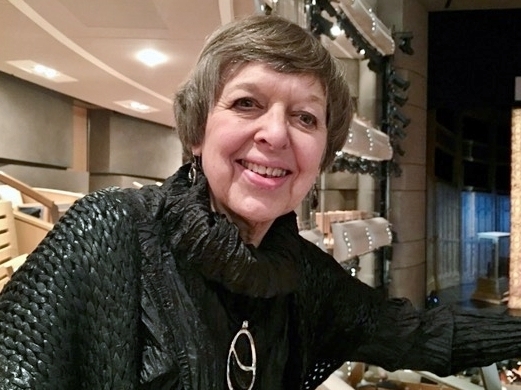
Professor emerita Carol Cass takes in a performance of "Anna Bolena" by the Canadian Opera Company, at the Four Seasons Centre in Toronto, Ontario.
In 1996, Carol Cass was appointed first official chair of the University of Alberta's Department of Oncology, joining the ranks of the earliest female department chairs in the Faculty of Medicine & Dentistry. That same year, Diane Cox accepted the position of Chair of the Department of Medical Genetics, while Alberta's Pediatric Nephrology founder Frances Harley stepped up as acting chair of the Department of Pediatrics for the second time, having already served as acting chair in 1984.
Cass, a former Tier 1 Canada Research Chair and now professor emerita of oncology, says that the University of Alberta's Department of Oncology was born 25 years ago of negotiations between the Alberta Cancer Board (now Cancer Control Alberta, Alberta Health Services) and the University of Alberta, to form a partnership between clinical and academic oncology based at Edmonton's Cross Cancer Institute.
When Cass accepted the position of chair of the Department of Oncology, she also accepted the position of Associate Director of Research at the Cross."I was part of two leadership teams," Cass said, explaining that that several of the clinical departments at the Cross (led by professor emeritus Tony Fields) overlapped with the academic divisions of the new Department of Oncology.
"We created a partnership that was really intertwined in terms of values and goals."
Tackling cancer in Alberta at the intersection of care, research and education
Event Info
The Department of Oncology invites you to celebrate their 25th Anniversary on Friday, May 25, 2018, in the Zane Feldman Auditorium, Cross Cancer Institute, 11560 University Ave, Edmonton, AB
Cass says the idea was to develop a one-stop shop where cancer patient care, research and education would intersect, making it possible to collaborate and share resources.
"The advantage of the system for an Albertan is that they have access to the world standard of care in most instances," Cass said. "I've been amazed over the years when people that I know from outside of Alberta say 'wouldn't you want to go someplace else for cancer care?' and I have always felt that we actually do have access to the highest quality of care right here."
Charting a course to fight cancer through a series of 'firsts'
Cass and her husband came to the University of Alberta in 1970 when her husband was offered a position in Botany. Having recently earned her PhD in Zoology on cell resistance to drugs, Cass secured a postdoctoral position with Alan Paterson at a pivotal moment in his research career―he had just discovered a process responsible for transporting molecules into and out of cells, which is involved in the uptake of certain nucleoside anti-cancer drugs. This historical discovery set Cass on a path to becoming an internationally recognized expert on membrane transport of nucleoside drugs. A Fellow of the Royal Society of Canada, Cass has won many research awards during her career.
As a female basic scientist in a time when there were few women in leadership roles, Cass served as a role model to many. For many years, she was the only female professor in the Department of Biochemistry. Before leading the Department of Oncology, Cass was the first female chair of the former National Cancer Institute of Canada's (NCIC) Advisory Committee on Research, the primary research policy committee of the NCIC. She became Director of the Cross Cancer Institute in 2003, making her the first basic scientist in Canada to serve as director of a comprehensive cancer centre. In 2005, she helped to establish the Alberta Research Tumour Bank (ARTB), one of the first of its kind in the country, in the role of Executive Director.
Passing the torch to the next gen of Alberta cancer researchers
In spite of these accomplishments, Cass feels most satisfied about seeing her former trainees grow into today's top cancer scholars.
"John Mackey is a terrific example," Cass said. "He was Alberta-born, Alberta-trained. He studied in my lab as a resident, and he's become one of the leading researchers in breast cancer in the world. He's committed to staying in Alberta and working with cancer patients to oversee research that is designed to improve our standards of care for breast cancer patients."
Cass says that Alberta has one of the finest reporting systems for cancer patients in the country, which allows researchers like Mackey to follow individual cancer patients throughout the course of their disease, and do it in a way that is representative of the population.
"Alberta is large enough to be able to answer questions about common cancers that go beyond jurisdiction. I'm very optimistic at the potential for achieving unique successes here in Alberta."